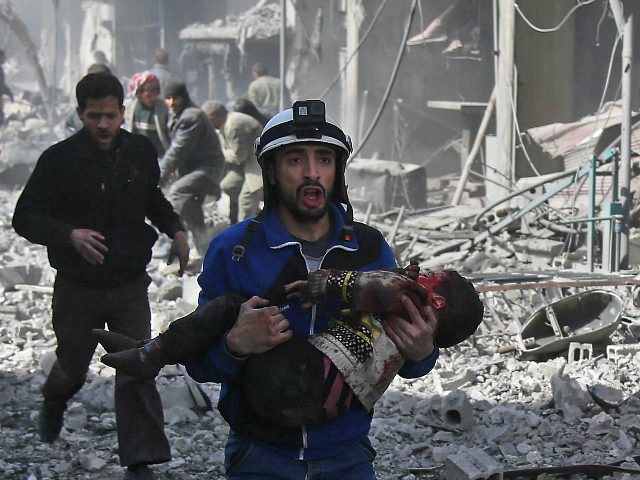Thirty-eight more people were reportedly killed in the Assad regime’s bombing campaign against the Eastern Ghouta district near Damascus, bringing the Syrian Observatory for Human Rights’ estimate to 310 killed and over 1,550 injured since Sunday.
The SOHR “monitored a decrease in the chances for the wounded to receive treatment, or even rescue the critical cases,” in part because the intensified air and artillery campaign appears to be deliberately targeting hospitals and field medical facilities. The report goes on to note a critical shortage of doctors in the area even before the hospitals were attacked.
“We are waiting our turn to die. This is the only thing I can say,” 22-year-old Eastern Ghouta resident Bilal Abu Salah told Reuters.
“Nearly all people living here live in shelters now. There are five or six families in one home. There is no food, no markets,” he said, expressing fears for the safety of his pregnant wife.
“I saw Hala and Sara lying in blood with their mother hysterical and our other children shell-shocked on the floor,” said construction worker Abdullah Kahala, recalling how a bomb blast ended his family breakfast by wounding two of his children. He said the family spent the past week digging through rubble with their bare hands.
“Where is the international community, where is (the UN) Security Council?” asked a Syrian doctor quoted by the BBC. “They abandoned us. They leave us to be killed.”
“My appeal to all those involved is for an immediate suspension of all war activities,” U.N. Secretary-General Antonio Guterres said to the U.N. Security Council on Wednesday.
“I believe Eastern Ghouta cannot wait. This is a human tragedy that is unfolding in front of our eyes and I don’t think we can let things go on happening in this horrendous way,” he declared, saying a cease-fire would allow humanitarian aid to be delivered to civilians and the worst of the injured to be evacuated for treatment.
“International humanitarian law was developed precisely to stop this type of situation, where civilians are slaughtered in droves in order to fulfill political or military objectives,” U.N. High Commissioner for Human Rights Zeid Ra’ad al-Hussein added.
“How much cruelty will it take before the international community can speak with one voice to say enough dead children, enough wrecked families, enough violence, and take resolute, concerted action to bring this monstrous campaign of annihilation to an end?” Zeid asked.
The human rights commissioner denounced the strikes on medical facilities and also said the crisis must not be used to force the displacement of civilians, a tactic the Syrian regime has used during sieges of other rebel-held areas.
“The fighting appears likely to cause much more suffering in the days and weeks ahead. This is madness and it has to stop,” said International Committee of the Red Cross representative Marianne Gasser.
“Wounded victims are dying only because they cannot be treated in time. In some areas of Ghouta, entire families have no safe place to go,” Gasser said.
However, Assad’s ally Russia signaled it would use its veto power against a U.N. resolution demanding an immediate cessation of hostilities in Eastern Ghouta.
“We cannot simply decide that there is a ceasefire. That’s a long and complex process to achieve,” claimed Russian U.N. Ambassador Vassily Nebenzia.
Instead, Russia called for a Security Council meeting on Thursday to discuss the situation. Russia has also denied allegations that its warplanes are participating in the bombing campaign against Eastern Ghouta.
Russian Foreign Minister Sergei Lavrov blamed militants from the al-Qaeda-linked Nusra Front for the Eastern Ghouta bloodshed and said on Wednesday that the campaign against them in Ghouta would be modeled on the brutal siege of Aleppo in 2016.
“In keeping with the existing agreements, the fight against terrorism cannot be restricted by anything,” said Lavrov.
“One has to ask where is Russia, where is Iran, which had pledged in Astana to guarantee a cease-fire also in eastern Ghouta,” a spokesman for German Chancellor Angela Merkel said on Wednesday, referring to highly touted negotiations in Kazakhstan brokered by Russia, Iran, and Turkey.
“Without the support of these two allies, Assad’s regime would not be where it is today, and undoubtedly, without this support, this regime would have to show more readiness to negotiate in the UN process,” the Merkel spokesman charged.
The BBC notes that the Syrian government has allowed only one humanitarian convoy into Eastern Ghouta since late November, resulting in severe shortages of food. Doctors are reportedly resorting to using expired drugs because they have nothing else.

COMMENTS
Please let us know if you're having issues with commenting.